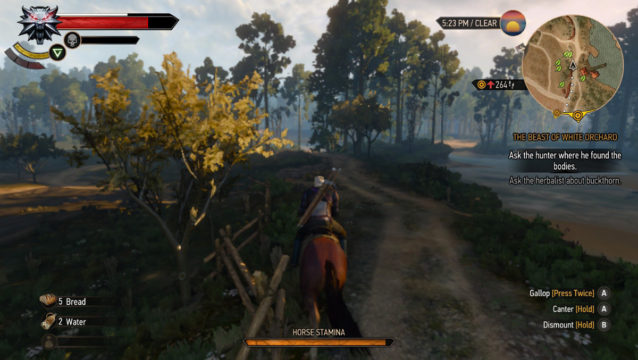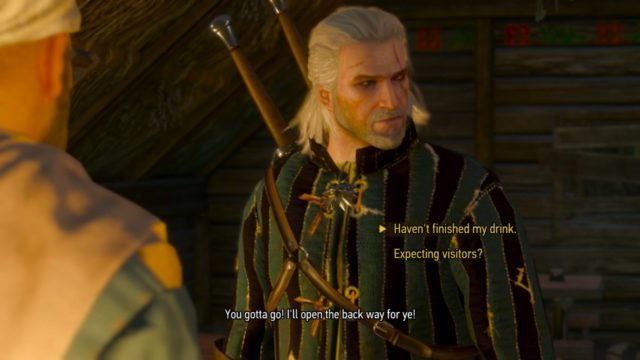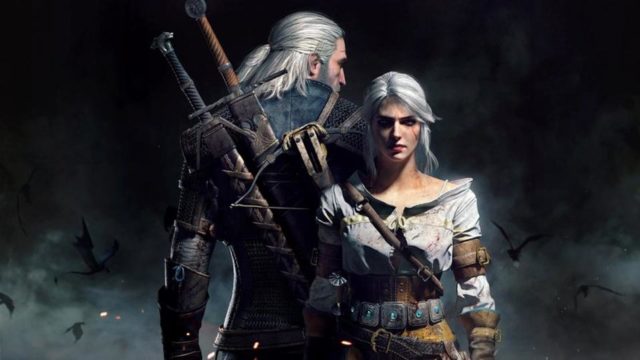Crazy amount of content, both main story and side quests; fun combat; engaging story that's easy to follow, even if you haven't played the first two games; strong voice acting; fantastic soundtrack
Significantly lower graphical quality compared to versions on other platforms; game crashed multiple times; a handful of places with audio issues, including spoken dialogue that was missing or barely audible; controlling Geralt felt awkward and clunky at times
Back in 2017, I watched my boyfriend play The Witcher 3: Wild Hunt on his PS4 and quickly found myself engrossed in watching the story unfold. The game was intriguing, absolutely gorgeous, and the soundtrack was a delight to listen to. Though he hadn’t played the first two games in the series, we both found it pretty easy to follow what was happening. So, when CD Projekt Red announced they were bringing The Witcher 3: Wild Hunt — Complete Edition to Switch this year, I knew it was a game I was going to want to add to my Switch library.
Being totally honest, I found myself somewhat crestfallen booting up the game and getting past the opening cinematics. Compared to other platforms, Witcher 3’s graphics on Switch are significantly handicapped, to the point where it’s actually distracting. As the game opens with Geralt and his longtime mentor and father figure, Vesemir, on horseback in the countryside, I was so disappointed seeing how muddy the environment was. Grasses and the leaves in trees were indistinct blurs, the hides of Ghouls- meant to make the player recoil at how disgusting they are- weren’t very clear, and human hair didn’t have the same flowing quality.
I’m usually the person rolling my eyes at those I consider graphics snobs, but this is an example of a reduction in graphical quality that I feel impacts gameplay. However, eventually you do sort of get used to it, and if this is your first experience with Witcher 3, it may not bother you as much. Don’t get me wrong, Witcher 3 still looks good, it just doesn’t look as gorgeous as it does on other platforms.

For the most part, the game handles nicely. (I should note that I played the game entirely with a Pro Controller with my Switch docked.) Combat is incredibly fun, with the ability to make fast sword swings that deal less damage or slower swings that really pack a punch. Geralt can use Signs, simple spells that range from dealing fire damage, to using telekinetic powers, to briefly shielding against damage and more. Switching between them on the fly during combat was easy and seamless; I had a great time using the fire spell, Igni, against enemies, and mixing in Signs with swordplay keeps combat feeling fresh.
However, I did find that at times, Geralt felt unresponsive or moved in a somewhat jerky manner, especially when trying to guide him over enemy remains to loot or while using my Witcher Senses to explore an area. It felt like when pressing A to “examine” clues, for example, sometimes nothing would happen unless I moved Geralt to be standing at just the right angle or distance from the thing I was interacting with, despite the button prompt coming up on screen. This wasn’t happening constantly, but frequently enough to be noticeable and a bit frustrating.
What was more frustrating were the times when the game inexplicably crashed and closed; I was lucky that every time this happened was mere moments after my last save, but I have no idea what caused this. Also strange were moments in the game where Geralt’s spoken dialogue was barely audible or missing altogether, while the other characters were loud and clear. This was another bug that happened only a handful of times, but it was definitely odd. (Good thing the game has captions.)
Small gripes aside, the world of Witcher 3 is vast and rich with content, both in the main storyline and the crazy amount of side quests and exploration you can do in this open world. The Complete Edition also comes with the two DLC expansions packed in, for even more content: Hearts of Stone and Blood and Wine. Geralt is an interesting character, and you often find yourself having to make dialogue decisions— some of which are timed— that not only shape his personality and sense of morality, but impact the story at some point in the game. The player is sometimes given a choice to either use Axii, the mind control Sign, to force troublesome NPCs into cooperating, pay them off with coin, or have Geralt just make threats that usually lead to killing aggressive or argumentative types. Signs can be leveled up, and Axii eventually must be leveled up enough to continue to use it to influence the outcome of conversations; I generally went the more violent route and just took out the people that I felt really deserved it and totally did not deserve getting paid off.

Storytelling in Witcher 3 is incredibly strong, as is the character development of both Geralt and other main characters. It helps that the game’s voice acting is really well done; with the exception of a couple of characters (here’s looking at you, Triss and Dandelion), I found that the voice acting played a significant part in the success of the narrative. It’s easy to find yourself becoming invested in the stories of many of these people. Geralt is on a quest to find his adoptive daughter, Ciri, who is being chased by The Wild Hunt, a group of wraiths that travel the skies on undead horses and bring brutal frost and snows with them. Through some really cool storytelling elements that let you take control of Ciri during flashback sequences, the player not only gets to learn more about Ciri, but she becomes more than just a person that the player is told Geralt cares for deeply. She becomes as alive as he is, with her own personality and skills.
An early example of the depth of the game’s character development and the weight your choices hold is in the story of a character named Phillip Strenger, or The Bloody Baron. Geralt’s search for Ciri leads him to the Baron, who will only divulge what he knows about Ciri if Geralt agrees to help him find his missing wife and daughter. The story is a mandatory part of the game’s main quest, up to a certain point; I actually didn’t register when the storyline became optional until I completed it all the way through, because I became so drawn into the plot and wanted to know how the story of the Baron and his family ended. The Baron is a complicated man who commits some terrible sins, but he’s far from one-dimensional, and you soon learn that a number of characters involved in his story are also multi-faceted and far from perfect. Gameplay decisions the player makes ultimately determine how the Baron’s story ends, but it’s totally not clear to first time players which of their decisions are going to write his fate. Which is good, in that the player is left to just focus on what they feel is the right choice to make, rather than being caught up in thinking, “Well if I do this then this will happen, but if I don’t do this then…” and so on.

On the subject of gameplay decisions and character development, the player can choose to romance either of Geralt’s great loves: Yennefer of Vengerberg or Triss Merigold. Geralt can also have dalliances with a number of other women throughout the game if the player so chooses, though they don’t impact Geralt’s relationship with either Yennefer or Triss. These romances play out throughout the duration of the game and also have lasting consequences on the story’s outcome. I may have gotten a little too much satisfaction from shooting down Triss at every possible moment so I could get Geralt and Yennefer together in the end.
Witcher 3 offers deep crafting systems and customization elements, though none of it is required of the player. Geralt can have blacksmiths and craftsmen around the world create armor and weapons; he can engage in alchemy to mix powerful potions which cause myriad status effects, and the player can allocate skill points to the skill tree that best suits their play style. If you really want to get into the weeds of mixing potions, crafting, and customizing high level gear, you’re free to do so, but if you would rather just level up in combat and allocate your skill points as you see fit, you can do that, too. I wouldn’t say that the game “punishes” you for not playing it “the right way,” but rather encourages you to experiment and do what feels right for you. If you couldn’t care less about alchemy, go ahead and ignore it. Don’t want to craft anything? Don’t have to.
Gwent, the fully-fledged card game within the game, is also totally optional but genuinely fun. It pits two armies against one another on a battlefield, with each player choosing one of four different factions to build their deck around. Throughout the world, Geralt encounters many people that he can challenge to a game of Gwent, earning rare and powerful cards if he wins. But again, this is an optional diversion that the game does not punish you for not partaking in; there are a couple of points in the main story where it’s suggested that the player partake, but they can still opt out of it if they’re just flat out not interested in playing.
Witcher 3’s soundtrack is one of the best I’ve heard in a game. It’s atmospheric and emotional, sweeping, and really grounds you in this cold, rough, harsh world. Folk and tavern songs help break up the solemnity (and are nice to listen to while I’m working), while battle music is intense and energetic. Here’s a mix of the music that plays both while you’re playing Gwent, and while in some taverns throughout the world.
The Witcher 3: Wild Hunt — Complete Edition isn’t quite perfect: it suffers from somewhat muddied visuals and slightly unresponsive controls at times, but they still don’t totally detract from what is one of the most engaging, entertaining, and fun games I’ve played in a long time. There were nights where I found myself up at least a couple of hours longer than I intended to be awake because I was having such a good time with this game. Geralt is just fantastic, and it’s really satisfying having him mete out justice in a world where so many people seem to be some sort of scumbag or utter loon. Totally recommended. Add this to your Switch library.
Nintendojo was provided a copy of this game for review by a third party, though that does not affect our recommendation. For every review, Nintendojo uses a standard criteria.




 ShareThis
ShareThis





